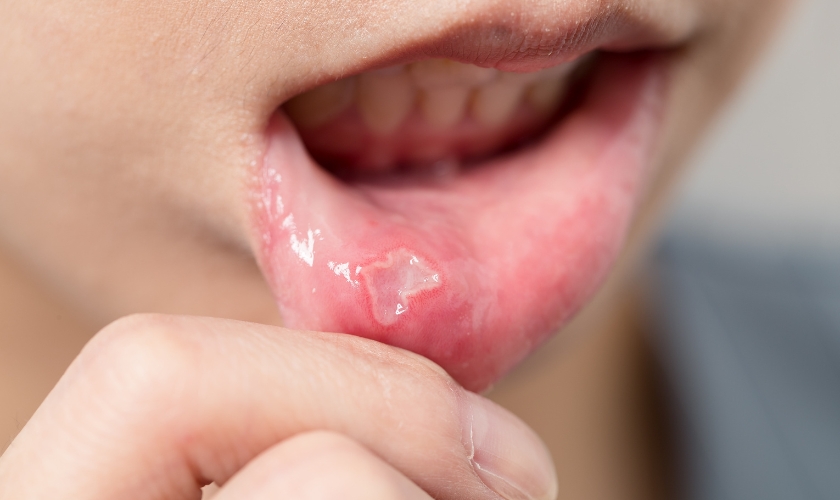Mouth ulcers, also known as canker sores, are a common and often painful condition that many people experience at some point in their lives. These small, shallow lesions appear on the soft tissues inside your mouth, including the lips, cheeks, and tongue. While they are generally harmless and tend to heal on their own within a week or two, their presence can make eating, drinking, and even speaking uncomfortable. Understanding the most common cause of mouth ulcers can help in preventing their occurrence and managing the symptoms effectively.
The Most Common Cause: Injury or Trauma
The most common cause of mouth ulcers is injury or trauma to the delicate tissues inside the mouth. This type of trauma can occur in several ways:
- Accidental Biting: Accidentally biting the inside of your cheek or tongue while chewing or talking is a frequent cause of mouth ulcers. The injury may not be severe, but the sensitive tissues inside the mouth can easily develop a sore as a response.
- Braces and Dental Appliances: Wearing braces, retainers, or dentures can sometimes cause friction against the inner lining of the mouth, leading to ulcers. The metal components of these appliances may rub against the soft tissues, especially if they are not fitted correctly.
- Rough Foods: Consuming hard or abrasive foods, such as chips, toast, or nuts, can cause small cuts or abrasions inside the mouth. These minor injuries can quickly turn into ulcers.
- Toothbrush Trauma: Brushing your teeth too vigorously or using a toothbrush with hard bristles can also lead to mouth ulcers. The excessive force or rough bristles may damage the gum tissue or the inner lining of the cheeks.
Other Contributing Factors
While injury or trauma is the leading cause of mouth ulcers, several other factors can contribute to their development:
- Nutritional Deficiencies: A deficiency in essential vitamins and minerals, particularly vitamin B12, iron, and folic acid, can make you more prone to developing mouth ulcers. These nutrients play a crucial role in maintaining the health of your oral tissues.
- Stress and Hormonal Changes: Emotional stress and hormonal fluctuations, especially in women, have been linked to the occurrence of mouth ulcers. Stress can weaken the immune system, making the body more susceptible to ulcers.
- Certain Foods: Some people are sensitive to certain foods, such as citrus fruits, tomatoes, chocolate, and spicy or acidic foods, which can trigger or exacerbate mouth ulcers.
- Medical Conditions: Underlying medical conditions, such as celiac disease, Crohn’s disease, or autoimmune disorders, can also lead to recurrent mouth ulcers. These conditions may cause chronic inflammation or affect the body’s ability to absorb nutrients, increasing the likelihood of ulcers.
- Medications: Certain medications, including nonsteroidal anti-inflammatory drugs (NSAIDs), beta-blockers, and some chemotherapy drugs, can cause mouth ulcers as a side effect.
When to See a Dentist
Most mouth ulcers are not serious and usually heal by themselves. However, there are times when it’s essential to get professional help. If a mouth ulcer persists for over two weeks, is particularly large or painful, or comes with other symptoms like a fever or trouble swallowing, it’s best to see a dentist in Burbank, CA. Ongoing or severe ulcers might signal a health problem that needs to be addressed.
If you often suffer from mouth ulcers, a dentist can help find the causes and suggest treatment options. This could involve adjusting dental devices, making dietary changes, or recommending supplements to correct nutritional gaps.
How to Prevent Mouth Ulcers
Prevention is key when it comes to avoiding the discomfort of mouth ulcers. Here are some tips to help reduce your risk:
- Maintain Good Oral Hygiene: Regular brushing and flossing can help keep your mouth clean and free from harmful bacteria that might contribute to ulcers. Use a soft-bristled toothbrush and avoid brushing too aggressively.
- Protect Your Mouth: If you wear braces or dentures, make sure they fit properly and do not cause irritation. Your dentist can make necessary adjustments to ensure a better fit.
- Watch Your Diet: Avoid foods that you know trigger ulcers or irritate your mouth. Instead, opt for a balanced diet rich in vitamins and minerals.
- Manage Stress: Since stress is a known trigger for mouth ulcers, finding ways to manage stress through relaxation techniques, exercise, or hobbies can help reduce the frequency of ulcers.
- Stay Hydrated: Drinking plenty of water can help keep your mouth moist and reduce the risk of irritation.
Mouth ulcers are a frequent and usually minor problem, but it’s important to know what causes them and when to get professional help. If you have ulcers that keep coming back or last a long time, seeing a dentist in Burbank, CA, can offer you the support and treatment necessary to keep your oral health in good shape.

